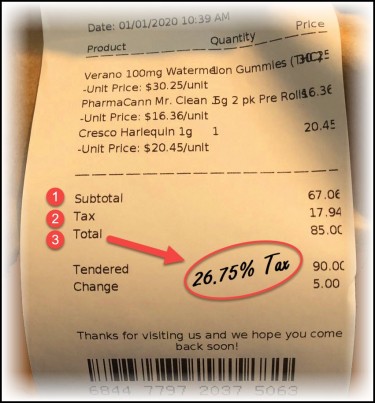
Evaluation of each state’s marijuana program
Americans for Safe Access Release State MMJ Report Card Which states did well and which failed?
Americans for Safe Access (ASA) just released their latest annual report, 2021 State of the States report: An Analysis of Medical Cannabis Access in the United States, in which they assess how well each state MMJ program is performing, when the time comes for patient care.
ASA categorizes states based on 100 categories including affordability, civil protection, barriers to entry, product safety, social justice, penalties and more. The report is presented each year to legislators in each state, including many patient and healthcare organizations. Additionally, the report provides recommendations that programs may make, particularly in relation to regulatory language and legislation. Her first edition was published in 2014, and since then state legislators have relied on her informed recommendations to improve their laws.
A press conference was held on February 22, 2022 to discuss the report.
“With regulatory improvements in government medical cannabis programs receding, millions of patients have limited or no access,” said ASA executive director Debbie Chugai. “It is the ASA’s hope that the report will inspire a renewed commitment from policymakers to patients to improve state laws and end the federal ban once and for all.”
“The Americans for Safe Access State-of-the-States Report has been an important resource for me as I work to ensure that all Pennsylvanians have access to medical cannabis,” said Pennsylvania State Representative Chris Rabb.
Results
There were only 7 states that saw a score improvement from 2020 to 2021: these were Arizona, Utah, Louisiana, Arkansas, North Dakota, New Hampshire, and Rhode Island. Meanwhile, Maine got the best grade of any state: AB and Illinois a B-. They were the only two to score higher than. C
The two states that performed worst were Nebraska and Idaho, as they received 0 points because of Prohibition.
Here is a summary of the ASA recommendations for some of the top selling cannabis states:
California
California, home to one of the world’s largest legal cannabis markets, surprisingly only scored a C+. Her recommendations for this year include encouraging lawmakers to close the disaster preparedness gaps for working patients, as well as addressing housing issues and DUI discrimination. Patients in California still face discrimination in the workplace simply because of their status as an MMJ patient and the fact that employers still make hiring and firing decisions based on the employee’s use.
Additionally, California residents still face rental issues, as leases can be set by tenants to prevent patients from consuming their cannabis at home. They also recommend police officers be discouraged from discriminating against patients during roadside sobriety tests, as the ASA believes patients should be exempt from roadside tests designed to assess how impaired one is. After all, they need their medication to function.
Colorado
Colorado also scored a C+. In the report, the ASA specifically expressed disappointment with the path Colorado lawmakers have taken in reforming cannabis laws.
The ASA believes that policymakers should hold an emergency meeting to immediately reverse HB1317, which has been the biggest concern for MMJ patients in the state as it entails higher fees for the program and forces patients to complete multiple rounds to undergo certification by physicians. In addition, physicians must also specify a patient’s maximum dose, which limits the sales a patient can purchase. Additionally, HB1317 limits cannabinoid levels as it limits potency, preventing Colorado patients under the age of 21 from purchasing concentrates.
For Colorado state lawmakers, protecting the civil rights of patients should be a priority for 2022. It’s bad enough that patients are still at risk of losing custody of their children and their jobs just because they are MMJ patients. They can also be denied organ transplants and unfairly discriminated against when roadside tested. Landlords can also adjust leases to prevent patients from dosing at home.
Michigan
Michigan scored a C on the report. The ASA recommends that lawmakers stop restricting caregivers from growing their own medicine as it is a crucial way for them to make their medicine more affordable and accessible. Regulators should also consider other means of making the drug more affordable, such as by introducing mechanisms such as rebates and financial hardship exemptions.
Policy makers should also provide for additional patient rights such as housing and employment protections. Product recall processes are recommended for improvement so that unaffected products are not affected by recalls that may result in supply issues for patients.
Florida
Florida received a D+, and the current laws clearly leave patients little choice in many aspects, particularly when it comes to protecting patients’ civil rights. MMJ sufferers in Florida do not have any protections to prevent employers from discriminating against them, and the ASA recommends extending these protections to all types of workers.
In addition, Florida patients have problems taking medication at home. They also recommend that cannabis used in the context of organ transplants and medical procedures should be treated the same as other types of prescription drugs. Nor should parents be denied any rights because they are patients.
Washington
Washington got a C- on the report. The ASA recommends that lawmakers fill other disaster preparedness gaps as well, particularly around DUI discrimination, housing and employment.
Patients in Washington should be exempt from all roadside testing, while lawmakers should seek strategies that can address patient resistance to accessing their medications, as there are numerous roadblocks across the state that make it difficult for patients to prepare their medications obtain.
The full report can be viewed here.
STATE MARIJUANA PROGRAMS, READ MORE…

ARE ALL STATE MARIJUANA PROGRAMS DOOMED TO FAIL?
OR..

WHICH STATE HAS THE HIGHEST MARIJUANA SALES TAX?

Post a comment: